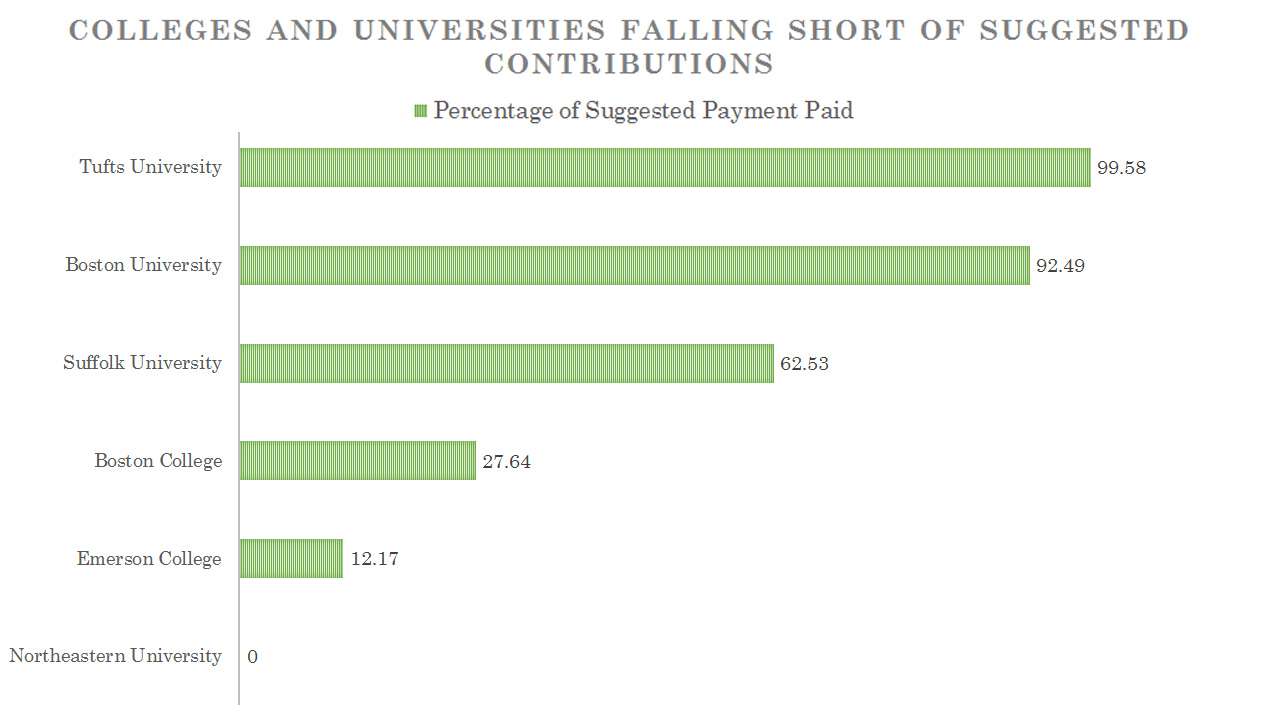During fiscal year 2014, 15 of the 19 colleges and universities in Boston did not pay their suggested amounts agreed upon as part of a program of voluntary contributions in lieu of taxes, known as the PILOT program, according to a report on the city of Boston’s website.
Of these colleges and universities, Boston University’s suggested payment amount is the highest at $6.5 million, yet the university only contributed $6,043,000 million at the close of the fiscal year.
Boston College paid more than $317,000 of the approximately $1,150,000 suggested payment amount. Harvard University paid approximately $2,217,000 of the about $4,347,000 suggested payment amount. Northeastern University paid none of the approximately $2,548,000 suggested payment amount. These numbers came to light following a report published in The Boston Globe Oct. 27.

BU contributes almost 60 percent of all PILOT payments from colleges and universities, said BU spokesman Colin Riley.
“In fiscal year 2014, BU’s more than $6 million PILOT, the same amount paid in the previous fiscal year, was 58 percent of the total PILOT the city received from the 23 educational institutions that own property valued in excess of $15 million, [which is] the minimum threshold city guidelines established for voluntary participation,” Riley said.
Under the Payment-in-Lieu-of-Tax, or PILOT, program, cultural, educational and medical institutions that own property valued at $15 million or more are encouraged to financially contribute twice a year to the City of Boston based on their tax-exempt property value. These contributions go toward funding city services, such as police and fire protection, snow removal and other services in an attempt to offset the cost of these necessities for residential and commercial taxpayers.
“The city maintains an ongoing dialogue with PILOT institutions on a range of topics, and we continue to work with these community partners and review their commitments in the existing program,” said Melina Schuler, spokeswoman for Boston Mayor Martin Walsh, in an email. “While the PILOT program is voluntary, institutional participation is both needed and expected, and institutions that don’t participate or participate with less than the full amount place a greater burden on the city’s tax-paying residents and businesses to meet the demand for essential public services.”
Riley said BU has been a long-time contributor to the city.
“BU was the first institution to sign a PILOT agreement with the city and has for more than 30 years been the highest PILOT contributor by a huge margin,” he said. “Over that period, BU has made more than $74 million in PILOT payments to the City of Boston.”
Riley also pointed out that BU has its own police force, and also pays for its own trash removal, recycling and snow removal, among other services, such as graffiti removal and landscaping, on public property bordering both its Charles River Campus and its Medical Campus in the South End.
BU has not only been supportive of the PILOT program monetarily, but in other ways as well, said Stephen Burgay, senior vice president of external affairs at BU. When the program underwent changes in 2011, he said, BU President Robert Brown was the chair of the PILOT Task Force.
“We not only adjusted, but the university was instrumental in fashioning the agreement that came out,” he said. “We are a leader in having a conversation with the city.”
BU’s willingness to pay is only equitable if other institutions contribute, Burgay said.
“When talking about escalating the cost and paying more, we and the City had an explicit understanding that it would be conditioned upon other colleges in the area agreeing to pay more money themselves,” he said. “In equity, it was not fair for Boston University alone to agree to an escalation in the cost and to pay more when other institutions are not paying anything or are reducing their payments. What we saw when the numbers came in was that other schools are reducing their payments and were not escalating them and, as a matter of equity, we felt that for us, staying around $6 million was the right thing to do.”
Northeastern was one of the nine educational institutions that paid nothing to the PILOT program for fiscal year 2014. But Northeastern pays taxes to the city on a voluntary basis, explained Renata Nyul, director of communications at Northeastern.
“We currently pay $2.1 million every year in property taxes to the City,” she said in an email. “We do this voluntarily because we acquired property that was on the tax rolls and, as good citizens, decided to keep paying the taxes. We are exploring ways to convert these tax payments into credit toward PILOT.”
Northeastern contributes $30 million to the city in benefits, Nyul said.
“As for the $30 million figure, $12 million is for financial aid to Boston students and $2.1 million is the property taxes mentioned above,” she said. “The rest is a vast array of community benefits, including the acclaimed ‘Foundation Year’ educational program, our hosting of a Boston public high school [Edward M. Kennedy Academy for Health Careers] on our campus, our Youth Development Initiative Project and the thousands of hours of community service contributed by our students, faculty and staff.”
Several Boston residents had a mixed response to the PILOT program.
Leo Hardiman, 64, of Boston, said the City should not ask colleges and universities to contribute financially to fund municipal services.
“The City should pay for services to get a good education for all students,” he said. “Certain companies and certain things should pay for it [instead of the colleges and universities].”
Courtney Fears, a second-year law student at Suffolk University, said she was in favor of the program.
“I do think it [the PILOT program] is important because Boston is filled with students, so a lot of the things provided do help the students, whether they like it or not,” she said. “So universities should pay their fair share. Since it’s voluntary, I don’t know if they could do much to encourage to pay unless it becomes mandatory.”














